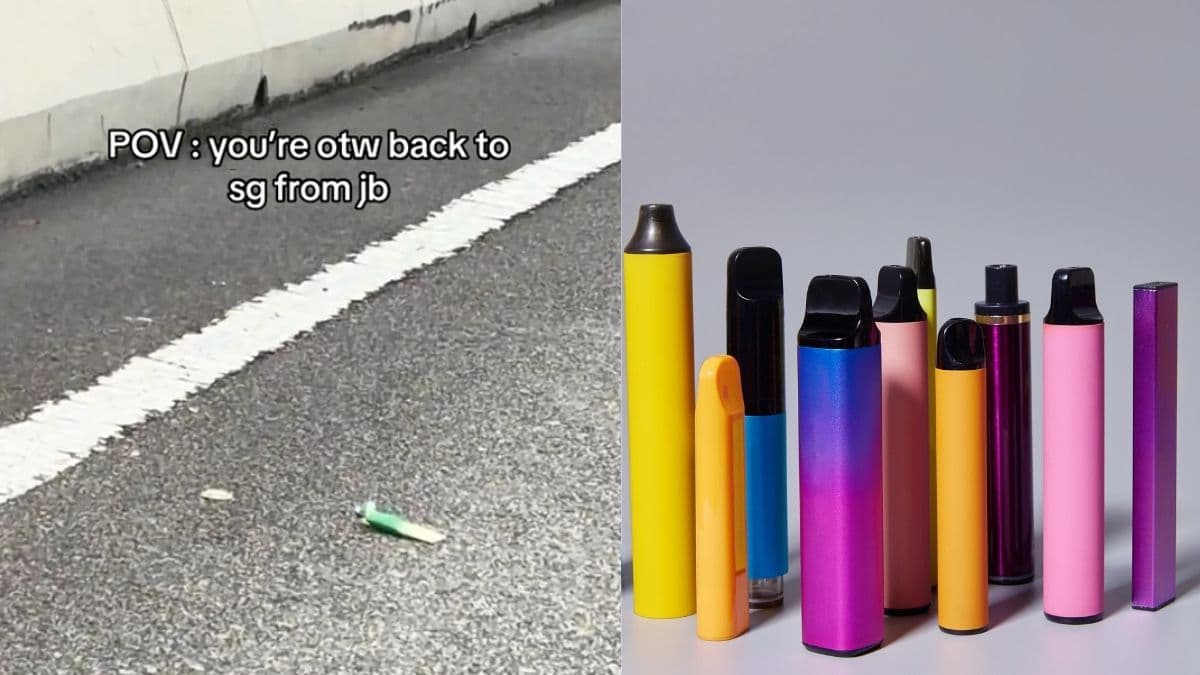Vapes dumped along Causeway amid new Singapore crackdown on etomidate pods
Travellers dumped vapes along the Johor Bahru–Singapore Causeway, fearing penalties after Singapore classified etomidate-laced vape pods as Class C drugs from 1 September 2025. Offenders face up to 10 years’ jail and S$20,000 fines under the Misuse of Drugs Act.

- Travellers dumped vapes on the Causeway after Singapore reclassified etomidate pods as Class C drugs.
- Offenders face up to 10 years’ jail, S$20,000 fines, and caning for trafficking, harsher than under the Poisons Act.
- Ong Ye Kung cited deaths and high seizure rates of etomidate pods as reasons for the change.
Travellers heading into Singapore from Johor Bahru abandoned their vapes along the Causeway in the lead-up to immigration checkpoints, leaving brightly coloured devices scattered across the road. The dumping appeared to be a last-minute attempt to avoid punishment under newly tightened laws.
Eyewitnesses reported numbers of discarded pods in a variety of shapes and colours. The scene suggested travellers were attempting to rid themselves of devices before reaching border checks.
Penalties under the Misuse of Drugs Act
From 1 September 2025, vape pods containing etomidate have been classified as a Class C drug under the Misuse of Drugs Act (MDA). Health Minister Ong Ye Kung announced the reclassification on 24 August during a community event in Serangoon.
Etomidate was previously listed as a prescription-only anaesthetic under the Poisons Act. The new classification brings significantly heavier penalties.
Possession or use can now lead to up to 10 years in prison, a S$20,000 fine, or both. Trafficking carries a maximum of 10 years’ jail and five strokes of the cane.
By contrast, offences under the Poisons Act had carried up to two years’ imprisonment and a S$10,000 fine.
Under Singapore’s drug framework, Class C drugs are substances with lower potential for harm than Class A or B drugs but still require strict control. Other substances in this category include the stimulant pipradrol and the sedative nimetazepam (commonly known as Erimin-5), both of which have approved medical uses but are tightly regulated due to potential misuse.
The MDA also allows for rehabilitation measures. Individuals identified as addicts may be required to undergo 12 months of treatment in a drug rehabilitation centre, unless discharged earlier by the authorities.
Concerns over health risks
The move is part of Singapore’s broader strategy against vaping, which has been banned for years. Authorities have raised concerns about the rise of vape products containing controlled substances that pose health risks and encourage abuse.
The Health Minister confirmed in July that several deaths in Singapore have been linked to etomidate abuse. He also revealed that about one-third of vape devices seized and tested in recent enforcement operations contained etomidate.
A government press conference on 28 August is expected to provide further details on enforcement and anti-vaping measures. Ong, who also serves as Coordinating Minister for Social Policies, said enforcement mechanisms are being strengthened in line with the new legislation.

